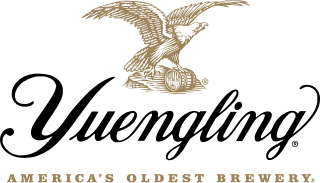Related Research Articles

D. G. Yuengling & Son, established in 1829, is the oldest operating brewing company in the United States. In 2018, by volume of sales, it was the largest craft brewery, sixth largest overall brewery and largest wholly American-owned brewery in the United States. Its headquarters are in Pottsville, Pennsylvania. In 2015, Yuengling produced about 2.9 million barrels, operating two Pennsylvania facilities and a brewery in Tampa, Florida.

Craft beer is a beer that has been made by craft breweries. They produce smaller amounts of beer, typically less than large breweries, and are often independently owned. Such breweries are generally perceived and marketed as having an emphasis on enthusiasm, new flavours, and varied brewing techniques.

Beer in South Africa has a long history, with a corporate history dating back to the early 20th century.

Northern Breweries was a Canadian brewery, with facilities in Sudbury and Sault Ste. Marie, Ontario, in operation from 1907 until 2006.
Hudepohl Brewing Company is a brewery established in Cincinnati, Ohio in 1885 by founder Ludwig Hudepohl II. Hudepohl was the son of Ludwig Hudepohl who emigrated from Malgarten, Kingdom of Hannover, in 1838. Ludwig II had worked in the surgical tool business before starting his brewery. Hudepohl combined with Schoenling Brewing Company in 1986. Today, the Hudepohl-Schoenling Brewing Company is a wholly owned subsidiary of Christian Moerlein Brewing Company.

Worthington Brewery, also known as Worthington & Co. and Worthington's, was founded by William Worthington in Burton upon Trent in 1761. It is the second oldest continuously brewed British beer brand, after Whitbread. The best known Worthington beers are its Creamflow nitrokeg bitter and White Shield India Pale Ale.

Great Lakes Brewing Company is a brewery and brewpub in Cleveland, Ohio. The first brewpub and microbrewery in the state, Great Lakes Brewing has been noted as important to Cleveland's local identity and as one of the initial forces behind the revival of the Ohio City neighborhood on the near West Side. In 2015, it was the 21st-largest craft brewery by volume and the 28th-largest overall brewery in the United States. The company was established in 1988 by brothers Patrick and Daniel Conway, both St. Edward High School graduates, in Cleveland's Ohio City neighborhood, located near St. Ignatius High School and the West Side Market. The brewpub and restaurant remain in their original locations, while production has expanded to adjacent properties.

Christian Moerlein Brewing Co. is a private beer company that began production in 1853 in Cincinnati, Ohio, by German immigrant Christian Moerlein. Before closing its doors in 1919 as result of prohibition, Christian Moerlein was among the ten largest American breweries by volume. In 1981, the brand was revived by the Hudepohl Brewing Company as a "better beer" a precursor to the craft beer category and is considered a pioneer craft beer of the craft beer movement. In 1999, Hudepohl-Schoenling Brewing Co. sold out to a group of out-of-towners, a sale that included the Christian Moerlein craft beer brand.
The production of beer in New Jersey has been in a state of recovery since Prohibition (1919-1933) and the Great Depression (1929-1945). Currently, the state has 123 licensed breweries: a large production brewery owned by an international beverage company, Anheuser-Busch InBev, and 122 independent microbreweries and 19 brewpubs. The growth of the microbreweries and brewpubs since the 1990s has been aided by the loosening of the state's licensing restrictions and strict alcohol control laws, many of which were a legacy of Prohibition.
The Nashville Brewing Company originally operated from 1859 to 1890 in Nashville, Tennessee. It was later renamed the Gerst Brewing Company and operated until 1954. The brewery was revived in 2016 by beer historian Scott R. Mertie, who had written a history of the Nashville brewing industry a decade earlier.

Rhinegeist Brewery is a craft brewery and craft cidery based in Cincinnati, Ohio. The company also sells their ciders under the name Cidergeist, using an alternative apple-shaped skull logo. The brewery's 25,000 square feet (2,300 m2) taproom and production facility is located in Cincinnati's Over-the-Rhine neighborhood, and occupies the former, pre-Prohibition bottling plant of Christian Moerlein Brewing Co. Rhinegeist operates an additional shipping, storage and innovation brewing facility in Cincinnati's Camp Washington neighborhood.
References
- ↑ "Goodbye to the Drawbridge Inn: Heyday Expansion". June 23, 2014. Retrieved June 6, 2021.
In January 1984, public discussion began related to a "small brewery". This was a hybrid of the previous dinner theater concept and represented visionary planning (at least for Greater Cincinnati) on Jerry Deters' part. In the 5 years since president Jimmy Carter had deregulated home brewing no one had tried the microbrewery concept in the region. The complex was planned to host a microbrewery, an entertainment center, a restaurant, and a festhaus.
- ↑ "Oldenberg Brewing Company". The Gnarly Gnome. Retrieved June 6, 2021.
Oldenberg is often considered the start of Cincinnati's "craft" breweries.
- ↑ "Oldenberg Brewery". Untappd.com. Retrieved June 6, 2021..
- ↑ "Oldenberg Beer Camp March 24-26, 2000 - Fort Mitchell, Kentucky, United States". Beer Hunter. Retrieved June 6, 2021.
- ↑ Demeropolis, Tom (September 24, 2013). "Commercial Real Estate: Neyer Properties buys former Oldenberg Brewing property: EXCLUSIVE". Cincinnati Business Courier . Retrieved June 6, 2021.
- ↑ Kelly, Brenna R.; Schroeder, Cindy (April 8, 2014). "Drawbridge Inn demolition underway". Cincinnati Enquirer . Retrieved June 6, 2021.